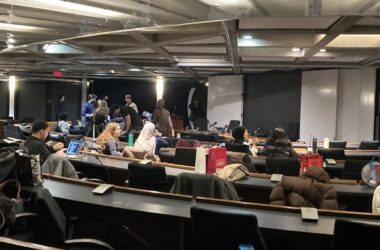One event stood out among the typical offerings at the SSMU Environment Committee’s Sustainable Eating Week, held from March 17 to 23: A Dumpster Diving 101 workshop led by McGill student Emma Melis, U0 Arts & Sciences. Melis was introduced to urban scavenging when she learned to reclaim discarded food and cook sustainably from people who dumpster dived their way through school. She grew to embrace the opportunity of offsetting food waste and now emphasizes it in her environmentalist lifestyle.
Promotion for the event underscored infrastructural issues that contribute to excess food waste and individual measures to reclaim unused food that would otherwise go to waste. A report by food rescue charity Second Harvest showed that almost 60 per cent of all food produced in Canada is wasted. This constitutes a net loss of over $49 billion per year, which would be enough to feed every Canadian for five months.
Melis introduced the workshop to attendees as a way to lift the stigma attached to urban food foraging. The workshop’s unconventional nature attracted more than 20 individuals who followed Melis through rush-hour underground traffic from campus to the Sherbrooke metro station. From there, we walked down back alleys, searching for promising bins.
Though our first bin was a bust, Melis encouraged us to stay hopeful—dumpster diving is inherently unpredictable. Many stores change their pick-up schedules, keeping divers guessing, and bins are often locked. Given all of the variables at play, finding unlocked bins at the optimal time to find the freshest over-packaged produce is an art in itself. Melis told workshop attendees that grocery store bins are best and are more likely to have untouched produce, while those from restaurants and personal homes likely only have scraps.
Our successful stops yielded mostly small furniture items, art, and home goods. Reclaiming these perfectly-usable pieces was gratifying; however, Melis focused on food items as a way to combat broader infrastructural issues that contribute to waste such as sell-by dates that cast off usable produce. She also emphasized the need for compassion while dumpster diving as an environmentalist.
“Rather than approaching this issue with an attitude of greed, [we should] consider this systemic problem of food waste from a place of compassion and humility,” Melis said. “Although a full dumpster means you’ll have some great finds that day, it also shows how much food waste is going on.”
This compassionate approach is evident in dumpster-diver etiquette—out of courtesy for those who empty the bins, their owners, and future divers hitting the same spot, Melis advised the group not to leave a mess behind. When diving, it is bad form to tear bags; rather, foragers should open them manually and tie them back up when finished. Along our route, Melis also noticed trash mixed in with recycling and vice-versa and encouraged us to move these misplaced items when we could.
Throughout the course of the workshop, we gained a wealth of dumpster-diving knowledge, but, for posterity, members of the community have collaborated on a map which gives potential divers a sense for the lay of the land. The emergence of these sorts of online dumpster-diving forums are a relatively new phenomenon and allow regular divers to share tips and adapt to the fickleness of garbage pick-up.
Many attendees asked about the legality of dumpster diving. Dumpster diving in Canada is legal as long as the garbage in question is not on private property. Melis advised us to stay calm, stop, and comply if confronted by law enforcement given that diving itself is not a punishable offence.
Melis hoped that the workshop would serve as a starting point to help participants feel more comfortable searching in their areas for promising dumpsters. As the weather warms up, she is looking to organize another similar event through the SSMU Environment Committee: A ‘Dumpster Diving 102’ may be on the horizon for those interested in honing their skills and diving through the bounty of spring produce yet to come.







